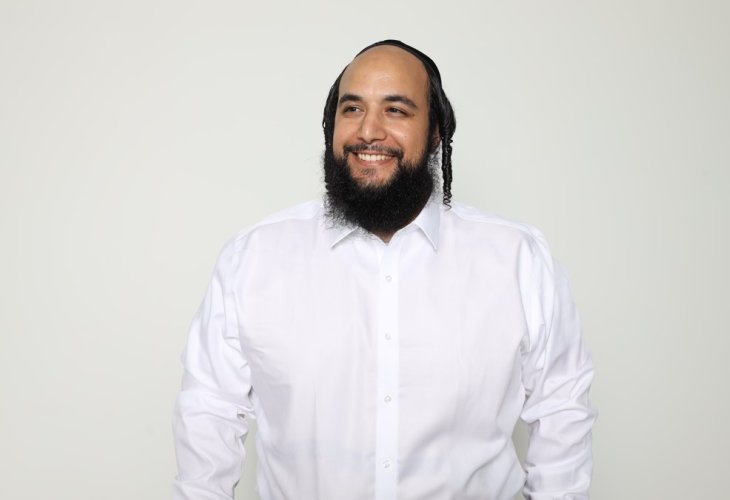"Before the Premiere, I Was Told: 'Either You Cancel the Show, or It Will Be Mixed'"
Singer Ohad Rady wanted to launch his debut show, only to be told he couldn't perform with gender separation. "It's hard to describe what I went through at that moment," he shares candidly and also offers insights on the matter.
 Ohad Rady (Photo Credit: Guy Zeltser)
Ohad Rady (Photo Credit: Guy Zeltser)This past month, singer Ohad Rady found himself in a state of complete helplessness. It was about two months after he had arranged for his debut concert to be held at one of the famous halls in the central region. Ticket sales had begun, and people were purchasing seats, filling up the venue. Then suddenly, an unexpected surprise arose, one he could not have imagined.
Surprise at the Venue
Rady takes a deep breath before sharing his story. "For as long as I remember, I've been involved in music," he notes. "I've been singing my whole life until I became religious, at which point I stopped singing because I wanted to dedicate my time to Torah study and strengthening myself for the family I was about to start. Baruch Hashem, I got married, had children, and in recent years, I returned to singing and began getting famous on social media. I sang with various bands and on different occasions, but only about two months ago did I decide it was time to launch my exclusive show."

Rady booked a famous venue for the date, began selling tickets, and arranged with orchestra members to reserve the concert date. "I didn't dream that something would change," he notes. "At some point, I asked to speak with the venue's usher to coordinate the specific seating areas for men and women, but to my surprise, the usher reacted with intense anger. He told me that gender segregation would not be allowed in their hall under any circumstances, and separate areas could not be designated. Initially, I thought this was just the usher's whim, so I reached out to the manager, but he also made it clear that he would not allow it. He told me there were two options: either pay an exorbitant fee or cancel the performance."
Rady expresses that it's hard to put his feelings at that time into words. "It was my first show ever, after I had already arranged with all the musicians and professionals accompanying me. I had already committed to people, and I felt I couldn't endure this challenge. The feeling was very frustrating because being a religious singer is already very difficult, and since becoming religious, I've found myself constantly deliberating—on what topics to sing, and what truly suits the audience. Suddenly, I realized there's also the issue of segregation, which affects me significantly."
To Sacrifice
Did the thought of performing for a mixed audience cross your mind?
"No. It was clear to me that I wouldn't do it, but I tried to find a solution that would allow me to perform separately. I spoke with various singers, including Yishai Lapidot, with whom I frequently perform, but he too had no idea how to solve the issue. I tried the last option—moving the concert to another hall, but I couldn't find any hall available during August, and the ones I did find asked for double the price which I couldn't afford to pay. Ultimately, I said to myself: 'Ohad, do you want to bring joy to people or fight? Do you want to sing or argue?' I knew the answer immediately and concluded that if my show isn't done wholeheartedly and joyfully, I would cancel it, and so I did."
How do you feel after making your decision?
"They say there's no greater joy than resolving doubts, but in my case, it's not a joy at all. Everyone knows that being a singer in the religious sector is tough and complicated, and what I went through just shows how difficult it is to stick to your beliefs. On the other hand, I had an opportunity to connect to the true authenticity within me, offering Hashem a sacrifice, feeling that I returned not just for nothing, but because my life is truly guided by the desires of the Master of the Universe, and there was a very sweet feeling in that. I hope I always succeed in standing up to such trials."
What gave you the strength to reach such a decision?
"Honestly, the greatest strength I receive is from the feedback from the audience. People tell me they love the songs and that it's important to them for the concert to have segregation. They also tell me they don't attend other concerts that don't have segregation, because it's important to them to adhere to the halachic topic. This resonates with my inner desire, because I'm not seeking success, but holiness. Unfortunately, as someone who grew up far from the religious sector, I grew up with the songs farthest from holiness. Since I became religious, I decided I want to bring the Mediterranean singing style that characterizes me to the religious community, to strengthen it and do everything according to the frameworks of the halacha. That is what led me on this path, and I am still on this path be'ezrat Hashem."
Rady notes that these days he is working on a Sukkot concert that, be'ezrat Hashem, will take place at the Gula complex in Petah Tikva. "I arranged clearly in advance with the managers there, understanding that a segregated event will be possible. I'll soon begin selling tickets for the concert, aiming them at people interested in a segregated event, and I'm sure there are many such people."

